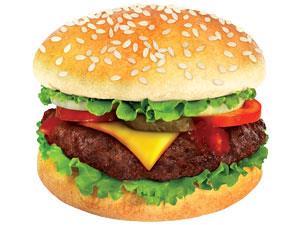The chemistry of burgers is just one of the topics that US broadcasters NBC cover in the set of educational videos they call Chemistry Now

These days cutting-edge science is on the cusp of creating affordable beef burgers by growing them from stem cells in labs. Researchers hope that one such technology will reduce the environmental impact of the many livestock needed to sate humans' taste for meat. In the meantime, however, there is still a use for regular, cow-derived burgers: as a fun way to engage students with chemistry.
The chemistry of burgers is just one of the topics that US broadcasters NBC cover in the set of educational videos they call Chemistry Now. Also explained are the chemistries of fear, cellophane, bullet proof materials and, entertainingly, pumpkin pie. But in this column, it's the burgers I'll focus on.
In six different videos NBC explains the chemistry going on in each aspect of the burger. What's nice is the breadth of science covered here. In the cheese video, for example, we learn about the physical chemistry of emulsions and how proteins denature. Then we turn to organic chemistry to find out about the reaction responsible for browning the meat patty during cooking. And we also touch on ideas about acidity and pH, as we delve into the processes of fermentation in the chemistry of pickles.
Each video is trying pretty hard to be fun to watch, so older children might find these a little young. Probably the best audience are middle school aged students, given the rather Americanised presentation style and the level of detail in the material.
While you're browsing the Chemistry Now pages, don't miss the chance to look up some of NBC's other free resources, including videos explaining the physics behind a golf swing and the maths of golf scoring (which I have genuinely never understood before).
And to keep things contemporary, check out the Science Behind the Newspages, where you can keep yourself up to date with the facts on hot button issues including quantum computing, crowdsourcing and drug-resistant bacteria.
Contact us
If you know of any websites that should be reviewed in Education in Chemistry please email the URL to Josh Howgego.









No comments yet